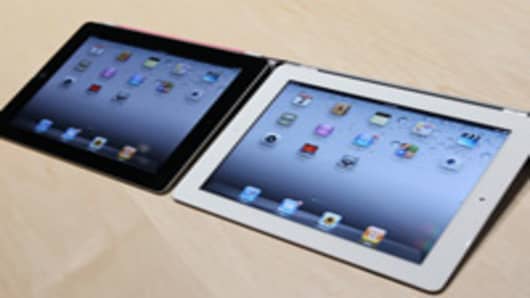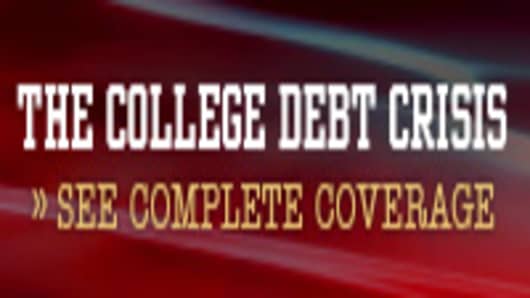Prentiss Ashford wouldn't call himself a big fan of economics, but the sophomore at Abilene Christian University in Texas says this semester he found himself turning to his econ textbook whenever he had spare moment.
"Just the fact that it's on the iPad and it's all on there, makes me a lot more interested," Prentiss says.
Abilene Christian University paired with digital publisher Inkling and McGraw Hill to test-drive new interactive textbooks in a handful of classes this year, as part of the school's three-year old mobile-learning initiative.
"I think there are some really interesting possibilities with digital books," says Bill Rankin, ACU's director of educational innovation. "Books that re-imagine what a books is; that integrate media; that integrate social networking."
The Inkling digital books use the touch technology on the Apple iPad to allow students to interact with the text, and other content. The students can digitally highlight material and make notes, in the same they would with a pen, but then those notes can be shared with others in the class.
"If I understand something and my friend doesn't, I can help explain to it to her and it reinforces it to me," says freshman Courtney Richardson. "You obviously can't get that in a traditional textbook."
For associate professor Ian Shepherd, the students' notes in the text provided real-time feedback on what they were absorbing in class and what they were missing.
"It allows me to focus on coming up with a new application that perhaps is more relevant to a student," he says. "It has reinvigorated my love for teaching."
ACU students were given the iPads for this year's pilot program. After using them, three-quarters of freshman say they'd be willing to buy their own tablets, if at least half of their textbooks were available on the iPad.
A national study from the Pearson Foundation also found students with tablets overwhelmingly prefer digital texts, the first sign of students embracing e-books in a couple of years of the college surveys.
Digital Textbooks At A Tipping Point
While students in college today are very attached to their mobile devices, the have not been enamored of e-books. In 2010, digital books accounted for just 3 percent of textbooks sales according to the National Association of College Stores.
Analysts say it's because until now e-textbooks have been little more little more than PDF copies of physical books, impractical for students who are accustomed to highlighting their paper copies as they study.
Researchers at online education firm Xplana say the shift toward tablets in the year ahead will jumpstart demand for e-texbooks in the $8 billion U.S. education book market.
"iPads and other tablets will be in the possession of about 20 percent of college students by the fall of 2012," says Xplana director of research Rob Reynolds. "That's a huge impact. It's fastest growing technology that we've seen in education."
Reynolds predicts digital book sale growth in the higher education market will double over the next four years to $1.5 billion by 2015, and account for 25 percent market share.
A big jump in the number of interactive texts available for the new tablet platforms next fall could also spur greater demand.
Focus on Higher Education
Privately-held Inkling secured funding and licensing deals with the world's two biggest educational publishers this spring, McGraw Hill and Pearson .
The move will allow the firm to produce more than a hundred new titles of interactive economics, science and medical textbooks available for the 2011-12 school year on the iPad platform, and eventually for Android tablets.
"There are only a few hundred titles in the undergrad world that make a really big pop in the market, and we're really focused on building those," says Matt McInnis, CEO of Inkling, the two-year old Silicon Valley publishing firm.
Like Inkling, the major publishers are also focusing their digital push in the university book market.
"While there may be smaller companies doing things, companies like McGraw Hill and Pearson are already leaders," says Benchmark Capital publishing analyst Ed Atorino.
Digital books are priced less than printed texts, but with commodity costs rising, the greater growth in digital will be positive Atorino says. Printing and distribution of traditional books account for more than 20 percent of the cost of the book.
"Digital is always a better model. It's very low cost and very high margin," he says. "The question is, can you get the volume?"
Publishers believe they can in the higher education market
"You've got device-greedy students," says Gary June, global chief marketing officer at Pearson. "There's a much higher penetration of Droid and Apple devices there, that make it a transition that could happen more quickly."
And just as universities helped drive student adoption of computers, by requiring their use in the last decade, they will likely play a role in pushing students to move toward tablets and digital books.
Brown University's Warren Alpert Medical School is requiring incoming medical students to purchase iPads this fall, with three digital medical textbooks on the Inkling platform required as part of next year's curriculum.
But industry analysts say when it comes to the elementary and high school markets, it will be a while before kids move away from traditional textbooks.
The Challenge in Grades K-12
In K-12 education, the bar for adoption of tablets and e-readers is much higher than at universities. They quandary for cash-strapped public school systems is how to provide access to e-book devices for every student, especially those who cannot afford to buy them for themselves.
"There are still a lot of challenges that have to do with figuring out how to use them, how to pay for them, " says Kathy Mickey, senior analyst of the education group at Simba Information.
Texas, Florida and California are among nearly two dozen states that have adopted initiatives to move toward digital books, but so far have they have generally opted to use supplemental digital course materials, alongside with printed books.
Publishing industry executives expect the $3.6 billion K-12 education book market will remain a hybrid market for some time.
"Unless there's already been a commitment to hardware of the some kind, we face a decision about whether to go ahead and create a digital product," says Pearson's Gary June. "Nobody can time when the saturation level will be high enough."
Print Books Won't Go Away
ACU's Bill Rankin says digital books will eventually dominate in the education market just as they have with leisure books. But, the printed word won't go away completely in the classroom.
"I think there's always going to be a place for traditional texts," he says. "People will always want the esthaetic experience of reading a hard cover book."
After this semester, ACU sophomore Prentiss Ashford is hooked on interactive digital books on the iPad. He says he carries everywhere, and its dreading having to give it back at the end of the year.
"It's going to break my heart. It's going to break my heart."







